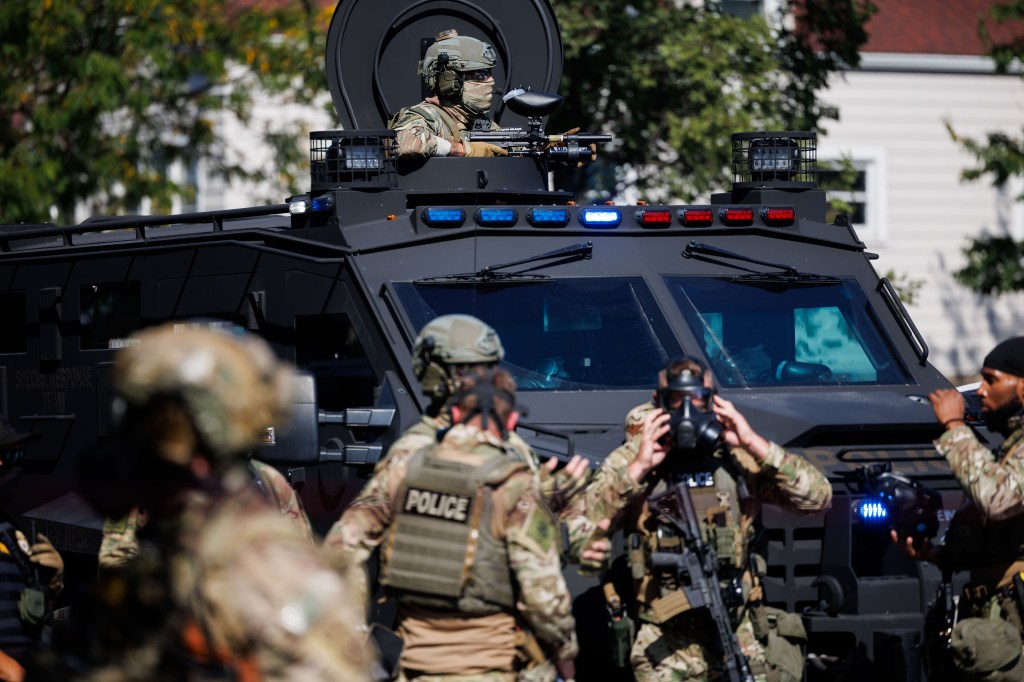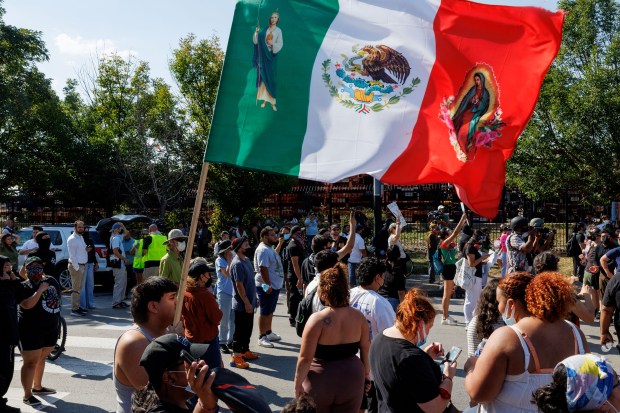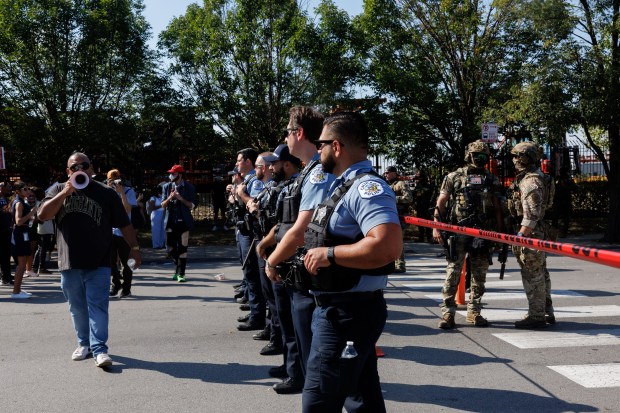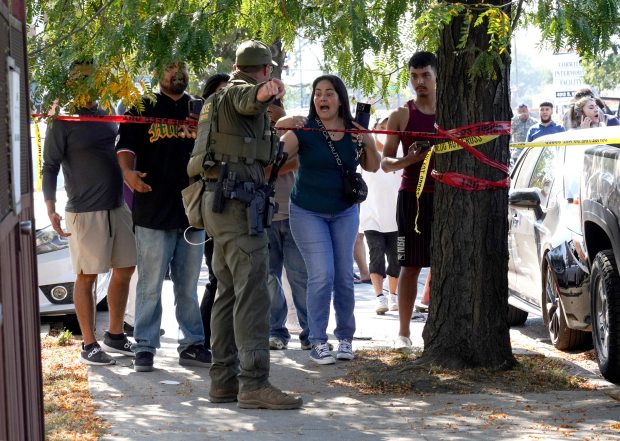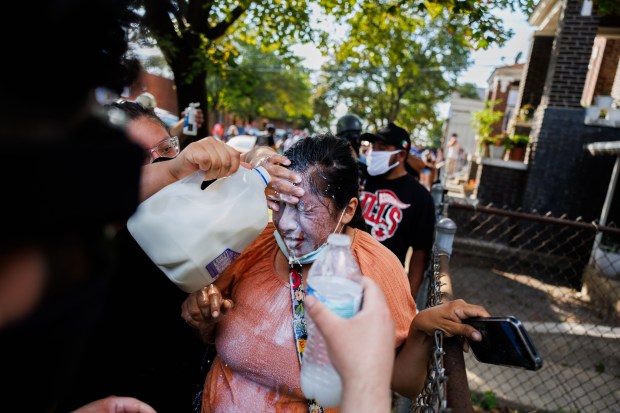President Donald Trump authorized a historic federalized deployment of 300 National Guard members Saturday to the Chicago area over the objections of Democratic Gov. JB Pritzker, with the White House saying it was needed to protect federal officers and assets conducting immigration enforcement amid “ongoing violent riots and lawlessness.”
But Pritzker and the state’s leading Democrats accused Trump of further escalating chaos and fear by utilizing a military deployment of National Guard members to support the controversial actions of U.S. Immigration and Customs Enforcement and Border Patrol officers already deployed in its aggressive “Operation Midway Blitz.”
Ironically, Trump was silent on Saturday about the deployment after months of mocking Chicago and Pritzker, a vehement critic of the president, over the city’s crime problems and threatening a federalization and mobilization of National Guard troops to the nation’s third-largest city. Trump made no statement or comment on his Truth Social social media network about the deployment as of Saturday evening.
Instead, it was Pritzker who said he had been given an ultimatum from Trump’s Department of Defense: “Call up your troops, or we will.”
“It is absolutely outrageous and un-American to demand a Governor send military troops within our own borders and against our will,” Pritzker said in a statement, adding that he believed it was Illinois National Guard members who were the troops being mobilized.
The governor’s announcement came just hours after federal immigration agents shot a woman in a disputed incident in Chicago’s Brighton Park neighborhood. While a Department of Homeland Security spokesperson said on social media that the woman was part of a group of drivers who “boxed in” and rammed a car carrying federal agents, activists said a car containing ICE agents crashed into a civilian car and the agents then began shooting.
The woman did not appear to be seriously injured but the shooting at the intersection of Pershing Road and South Kedzie Avenue quickly sparked protests nearby, in which federal agents used flash-bang grenades and deployed tear gas at protesters after some had tossed water bottles at the agents.
A deployment of the Guard was confirmed hours after Pritzker’s statement by the White House.
“Amidst ongoing violent riots and lawlessness, that local leaders like Pritzker have refused to step in to quell, President Trump has authorized 300 national guardsmen to protect federal officers and assets,” White House spokesperson Abigail Jackson said in a statement. “President Trump will not turn a blind eye to the lawlessness plaguing American cities.”
The White House did not elaborate on whether Illinois National Guard troops will be mobilized or if members of the Guard from out of state would be utilized.
But Pritzker countered that the Trump administration’s plans were unnecessary and would “pull hardworking Americans out of their regular jobs and away from their families all to participate in a manufactured performance — not a serious effort (to) protect public safety.”
Despite Trump’s repeated threats of military intervention, the governor has maintained, “There is no need for military troops on the ground in the State of Illinois.” He said state, county and local law enforcement have been coordinating to ensure the constitutional rights and public safety are preserved around ICE’s facility in west suburban Broadview, where sizeable protests have routinely resulted in activists and residents being tear-gassed and shot with pepper balls and other projectiles.
“I will not call up our National Guard to further Trump’s acts of aggression against our people,” Pritzker said.
The announcement comes nearly a month after Trump’s Department of Homeland Security launched its Operation Midway Blitz surge of immigration enforcement activities on Sept. 8, which DHS said has resulted in more than 800 arrests. A memo sent Sept. 26 by DHS to the Department of Defense, which has been obtained by the Tribune, stated that the troops were needed to protect ICE personnel and facilities.
It also follows one day after DHS Secretary Kristi Noem visited the Broadview ICE facility at 1930 Beach St., where she stood on the roof surrounded by heavily armed agents while observing protests on the ground below.
Despite the demonstrations, Noem maintained the people of Chicago “are grateful you are here” and told agents as they prepared to leave the facility for enforcement activities, “We’re going to go hard.”
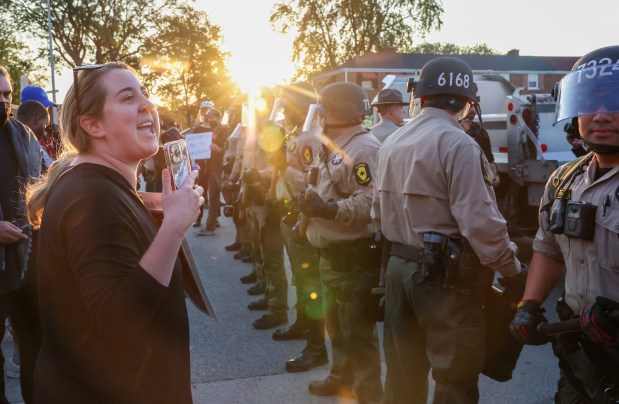
Noem also spoke of an expansion of ICE’s facility by purchasing a nearby building and said it would “send a message: We’re not just here, we’re here to stay, and we’re expanding and we’re going to make this city safe again.”
The federal operations have cast a wide net across the Chicago region, and while Trump officials claim they are arresting “the worst of the worst,” ICE and federal Border Patrol agents have been accused of repeatedly arresting and detaining American citizens and individuals who did not have criminal backgrounds.
Following the governor’s announcement, Democratic leaders in Illinois criticized any effort to deploy troops to the state.
“Terrorizing families with midnight raids and military troops in our streets is writing a shameful chapter in our nation’s history,” U.S. Sen. Dick Durbin said in a statement. “This President is not intent on fighting crime. He is intent on spreading fear.”
U.S. Sen. Tammy Duckworth added that federalizing National Guard troops is “a dangerous, un-American, and unconstitutional abuse of our military, intended to instill fear and threaten American civil rights.”
“Our military men and women signed up to defend the Constitution and our rights, not be used as political props or to silence dissent. Illinois does not want or need troops in our cities. Full stop,” said Duckworth, an Iraq War veteran.
U.S. Rep. Robin Kelly, who is running for Senate to replace Durbin, who is retiring, said in a statement that Trump is “playing dictator and abusing his powers.”
“President Trump is bringing war to Chicago. He’s called our city violent and out of control, yet he is the one who has endangered our communities, terrorized immigrants, and wreaked chaos,” she said.
Another Senate candidate, Lt. Gov. Juliana Stratton, said, “Our city is not a sandbox for Donald Trump to play dictator. It’s intentional cruelty that will devastate families and scar our communities.” While U.S. Rep. Raja Krishnamoorthi said the National Guard “should never be used as political props, and Illinois will not stand by while the Trump Administration tries to turn law enforcement into a weapon of fear.”
Pritzker has regularly urged residents to utilize peaceful protests to voice opposition to the immigration enforcement push and to avoid contentious interactions with agents — something he said he believed Trump was encouraging to provide the president with a pretext for sending in the Guard.
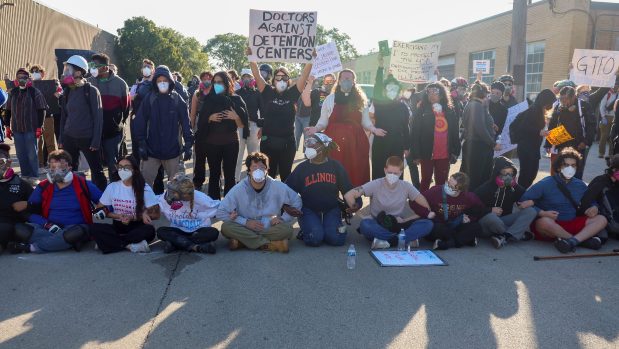
But Hands Off Chicago, a group supported by a number of nonprofits, advocacy organizations and unions, said “simply asking people to know their rights and speak out has already proven insufficient” and called for a stronger state response.
“Advocacy organizations, elected leaders, faith leaders, labor, business, community groups, and more have and will continue to peacefully exercise our constitutional rights in protest of military occupation by the Trump Administration,” the group said. “We urge our state and local elected leaders to think creatively and aggressively about the assets available to warn residents and protect peaceful protesters.”
Trump previously federalized Guard troops in Los Angeles after sporadic anti-ICE protests in June and did the same along with law enforcement in Washington, D.C., in August. Early last month, he said he was deploying the Guard to Memphis with the support of Tennessee GOP Gov. Bill Lee, and late last month he said he was authorizing the Guard to go into Portland, Oregon, over the objection of local officials.
On Saturday night, Judge Karin Immergut, a Trump appointee on the U.S. District Court in Oregon, issued a temporary restraining order blocking the president’s mobilization of 200 National Guard members in Portland, writing the decision to deploy troops was not “conceived in good faith” and that the president’s claims about chaos in Portland was “simply untethered to the facts.”
Oregon Attorney General Dan Rayfield, a Democrat, called the ruling “a healthy check on the president.”
“It reaffirms what we already knew: Portland is not the president’s war-torn fantasy. Our city is not ravaged, and there is no rebellion,” Rayfield said in a statement that echoed Pritzker’s remarks about Chicago. “Members of the Oregon National Guard are not a tool for him to use in his political theater.”
Under the Posse Comitatus Act of 1878, the Guard is prohibited from conducting law enforcement activities on U.S. soil. A federal judge in California ruled the Guard’s actions in Los Angeles violated that prohibition, but the case is being appealed. Pritzker also has threatened a lawsuit over the Guard’s use in Illinois.
Trump’s federalization of the National Guard troops, despite the governor’s objections, is unprecedented in Illinois. State officials have stated that there is no historical record of the National Guard being federalized for an in-state response without the governor’s request or agreement.
In August, Trump threatened to send National Guard troops to Chicago. At first, he said it was to tamp down overall crime, following up on his moves to deploy troops in Washington, D.C. The administration later revised that messaging, saying troops were needed to protect immigration officers and buildings.
As the White House has pushed for more deportations, the president has also slammed sanctuary laws across the nation, including in Chicago and Illinois, that prevent local law enforcement from working with federal agents on immigration enforcement. Under Illinois’ TRUST Act, signed into law in 2017 by a Republican governor, local and state law enforcement agencies are generally prohibited from assisting federal immigration enforcement with deportations or related tasks.
Meanwhile, the federal law enforcement presence has also grown more visible in recent weeks, with agents and officers seen walking through downtown Chicago and driving into numerous Latino neighborhoods and suburbs with significant Latino populations to stop people and make arrests. Multiple videos on social media have shown agents arresting people on the street while being met with jeers and other resistance from passersby and residents.
That’s exactly what happened Saturday at the scene of the shooting in Brighton Park when a tense standoff developed between activists and federal agents.
In the hours after the agents shot the woman, activists gathered by the intersection where it occurred and began yelling at and mocking federal agents. After some protesters threw water bottles at the agents, the agents responded by deploying tear gas and chemical “pepper ball” bullets at protesters. The agents also made several arrests before leaving the scene. The protesters then also left.
The DHS spokesperson said the woman who was shot drove herself to the hospital and a spokesperson for Mount Sinai Hospital later said the wounded woman had been treated and released Saturday afternoon.
In the last 60 years, the Illinois National Guard has been called to Chicago largely to deal with rioting and other unrest. As word spread of the Rev. Martin Luther King Jr’s assassination in April 1968, for instance, riots and looting took place across the country, including in Chicago. At that time, the National Guard began as a state-active duty mission, but at the request of the governor’s office, the guardsmen were later placed on federal orders for the remainder of their response.
During the unrest that came during the Democratic National Convention later that year, Democratic Gov. Samuel Shapiro ordered thousands of National Guard troops to assist the almost 12,000 Chicago police officers, 1,000 federal agents and 7,500 U.S. soldiers already on duty to maintain law and order during the convention.
More recently, the Illinois National Guard was on the ground as the state administered thousands of COVID-19 tests, with nearly 3,000 Guard troops aiding in various missions across the state, including conducting about 233,000 tests. It marked the first time the soldiers and airmen had been mobilized primarily to combat a medical issue in the state of Illinois.
Following a request from then-Mayor Lori Lightfoot, Pritzker called for 375 Illinois National Guard members to assist local police in quelling civil unrest following the death of George Floyd on May 25, 2020, in Minnesota. The following year, the governor activated 125 members of the National Guard again at Lightfoot’s request ahead of the guilty verdict of Derek Chauvin, the ex-Minneapolis police officer convicted in Floyd’s murder.
Originally Published:
First Appeared on
Source link

